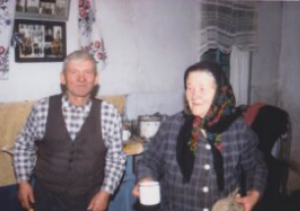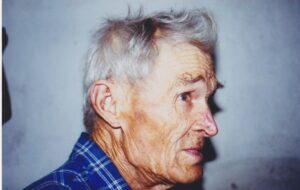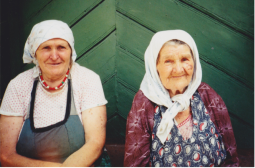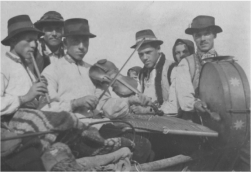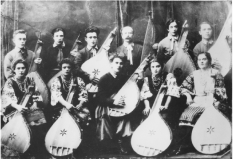Vira Trokhymivna Oliinyk (Cherkasy region)
—Did your grandfather or father have any trade before collectivization?
Vira Trokhymivna: They owned land and farmed; they sowed wheat, oats, and everything. The field was divided between several peasants. There was a specific lot for melons; it was guarded. Then the harvest would be sold elsewhere. They had a trade, too. My father was a very good shoemaker. My grandfather, may he rest in peace, could do anything and used to make overcoats (kyreii). When guys were getting married, they also came to him because he could make the best vidloha, the covering for the head. He would cut it and make a svyta (overcoat), too. A young man needed a svyta, and my grandfather used to make these combinations very well. I have a svyta that he made; I cut the sleeves because I used them to make felt boots.
—So, the people would come to your grandfather to place orders?
Vira Trokhymivna: Yes.
—Did he sell the clothes he made at the market?
Vira Trokhymivna: No, he only took orders from people. His father worked for the landowners sewing overcoats (chemerky); they were also called komzel′ky. When my grandfather swore an oath to serve as a soldier for twenty-five years, his father made him a komzel′ka. One time, the draftees were walking down the street in fetters, and he was walking next to them without the fetters for he wouldn’t run anyway. At the time, if someone ran away from service obligations, he would spend three years or so somewhere instead of his army service, so the next thing for him would be serving as a soldier (soldatchyna). So, when my grandfather was walking with the draftees, landowners were passing by in three carriages with four horses each. Back in the day, the landowners—no matter how high their rank was—would stop and get out of the carriage if a young woman was walking by. She would bow, and the landowner would thank her, give his blessings, and give her something for her wedding. If the draftees were walking by, a landowner would stop, too, to give blessings for their service and a long life. This time, the landowner asked my grandfather, “Why are you wearing a landowner’s komzel′ka?” He said, “It’s not a landowner’s komzel′ka. I’m a son of Ivan Stepanovych Malomuzh who is your tailor, and he made one for me.” — “And why are you walking with the draftees?” — “Because I’m going to serve for twenty-five years in place of my brother; I already swore my oath.” — “Go then.” He gave his blessings, the draftees took a break from their procession, and they parted.
—What was the landowner’s name?
Vira Trokhymivna: I can’t remember.
—You said, your great-grandfather was a tailor?
Vira Trokhymivna: My father-in-law, too, because my father went to live with my mother’s family.
—Who was the one who worked as a tailor for the landowner?
Vira Trokhymivna: My great-grandfather. They all were tailors, and their brothers were woodworkers. They used to make deer horns out of wood, and the landowners even took those horns to Poland for sale. The landowner’s name was Sytnitsky; there were many of them.
—How did they pay your grandfather for his work?
Vira Trokhymivna: They invited him to weddings and paid with grain for the most part: sixteen to twenty-four kg or so, the pay wasn’t high.
—Did they bring their own fabrics?
Vira Trokhymivna: Yes. When a young woman was about to get married, a nice woolen cloth would be made for her.
—Did he sew fast? Why did people order the clothes from him since normally the women had to make the clothes themselves?
Vira Trokhymivna: He was good at it. He would make such nice creases on the coats.
—When did he sew, in the evenings?
Vira Trokhymivna: Most people used to sew during the winter. People would light an oil lamp in the evening and spin yarn and weave, if they knew how. My grandfather used to sew during the day because it was his job; the stitches on the overcoat had to be even. He would even count them on the dress to know exactly how much wool to use to have even stitches.
—Where did he buy thread and needles?
Vira Trokhymivna: Thread was spun from hemp, from linen. My grandmother and mother would spin yarn and make very thin and sturdy thread; they would then twine and dye the threads.
—What dyes did they use?
Vira Trokhymivna: Marigolds and carnations. It depended on the use of the thread. Sometimes they used the bark of oak or alder tree. They’d boil the bark in water and place the thread skeins into it.
—What about the needles?
Vira Trokhymivna: He bought the needles. They were brought to markets from elsewhere, Poland, I suppose. He used to say that the Polish needles were the best.
—Who did he buy them from?
Vira Trokhymivna: There was a store on the site of the present-day bus station. At some point, a Jewish woman named Malka used to sell things there and at another time, it was a market site. It used to be the center of the village with Ivana-Bohoskovska Church.
—Did people in your village weave kilims?
Vira Trokhymivna: Not kilims, but they made blankets and long narrow carpets for the floor. Later on, when the dyes appeared, people started dyeing the thread and weaving in basket style (v klitynku). At the time, almost every house had a loom because one had to weave enough cloth for a shirt, a skirt, a jacket, and a pair of pants. Clothes for the holidays were made from cloth, and everyday wear was made from linen.
…………………………………………………………………….
—What did your mother’s father do? Did he live here in the village?
Vira Trokhymivna: Yes, he was a peasant.
—Did he have a trade?
Vira Trokhymivna: They had a trade. Like I said, there were good carpenters and cabinet-makers in our village. My grandfather and his father were tailors. They (the Malomuzh family) lived close to the public pond. Stepan married Yavdokha, Hryhorii’s sister, Taras’s aunt. They had a very big family and worked for the landowner; they were honest workers. The landowner gave them some land in the forest to build a house and live.
Vira Trokhymivna Oliinyk (Cherkasy region)
—Did guys and girls go to do seasonal work?
Vira Trokhymivna: Yes.
—Where to?
Vira Trokhymivna: To the landowners [probably an ekonomiia]. The landowners had large plantations of sugar beets, wheat, and such. We used to go to do the work for them. I have a story to tell. We had a sugar beet field near the forest, and the landowner’s territory was where the bus stop is today. The women worked in the field and got tired. They went to the forest and lay down to rest. My mother and Maria Nykonorivna sat down and started singing “Gently Flows the Danube” (Tykho-tykhy Dunai vodu nese). The landowner Metelitsky was on his way and stopped to listen. When they finished, he said, “Come here.” They got scared thinking that he would beat them for not working. He said, “Here, take a karbovanets each and buy something as a souvenir from me. You sing so well.”
Vira Trokhymivna Oliinyk (Cherkasy region)
—When the kolhosp was set up, how old were you, ten?
Vira Trokhymivna: A bit older than ten. I was born in 1918, and the kolhosp started in 1928 as a SOZ. The first commune was in Demkove. It was organized by Demchenko and the kolhosp was called “Spikelet.” Our local people didn’t go there at first, but when SOZ was set up everyone went there whether they wanted or not because all their property had been taken: horse, plow, everything. One had to go.
—When was this?
Vira Trokhymivna: In 1925.
—Who confiscated people’s property?
Vira Trokhymivna: A committee came, took the property. They built stables and took the horses there.
—Did this committee consist of the local village residents?
Vira Trokhymivna: The members were locals, but the leaders were newcomers.
—Where from?
Vira Trokhymivna: Who knows? Some were Russian. There were more Russians in the leadership [than Ukrainians].
Vira Trokhymivna Oliinyk
—What was the priest’s role?
Vira Trokhymivna: It was important. He was considered an educator in the village. We had two seminaries in the village. My grandfather used to have tenants from Mokrivka who came here to study at the seminary. There were many priests here because we had two churches: Prechyshchanska [Church of the most Immaculate Virgin] and Ivano-Bohoslovska [Church of St. John the Theologian]. Not many people would go to Prechyshchanska Church; it was closer to Budyshcha. Almost all people from the village, the whole khutir, and the village of Borovykiv went to the Ivano-Bohoslovska Church. The service was in Ukrainian at all times. When Koshets was priest, his son studied somewhere and preached in Russian-Slavonic. For this he was reproached. My grandfather’s brother Stepan went to some official in Kyiv seven times to request that the priests be dismissed or preach in Ukrainian.
—Why didn’t he preach in Ukrainian?
Vira Trokhymivna: He didn’t want to. He said, “I learned this way.” So later on, he was dismissed, and Kozitsky became the priest. Afterwards, there were many priests. I even have the book of hours that was left behind by Myrhorodsky. I don’t remember what year it was when he was forced to renounce the priesthood and religion because it was “the opium.” He threw the book of hours away, and my mother picked it up and brought it home.
—How did he renounce religion?
Vira Trokhymivna: He said that religion was propaganda and that we were forced to believe. On the first day of Easter I went to the first grade; it was in 1929. A “Khorzon” [likely a corruption of “Fordson”] came from the co-op in Demkivka.
—What is a “Khorzon”?
Vira Trokhymivna: A type of tractor. It ploughed the ravines. We would go after it planting acacias, and the people were coming back from the church and crying because the priest renounced it.
—Who ordered that he renounce the church?
Vira Trokhymivna: The government, the Communist Party. I know that it was Baraniuk back then. When he was sent here, he wanted to be a tenant at my grandfather’s, but my grandfather said he had no room. Then he went to Usachka and got married there.
—Where was he from?
Vira Trokhymivna: From Russia. Later on, there was one Vorobiov who was shot. I don’t know who shot him. People made the funeral wreath for him at my grandfather’s house.
—What was he shot for?
Vira Trokhymivna: I don’t know. He was an inveterate communist. This was not in my time.
……………………………
—Was the church closed down?
Vira Trokhymivna: The churches were closed down, the crosses removed, and the icons burned. Where we have a fountain now near the community college that’s where they burned the icons. Some were burned, and some where kept. There was also a black and a red board. The red one was for those who went to work in the kolhosp early in the morning and worked well; on the black one people were marked as turtles [probably meaning “late” or “slow”].
Vira Trokhymivna Oliinyk (Cherkasy region)
—After the churches were destroyed, what were the funerals like? Who read the prayers during the funerals before the war?
Vira Trokhymivna: My grandfather would read before the war.
—Did ordinary people read the prayers as well?
Vira Trokhymivna: Yes. Baba [granny] Kateryna and did [grandpa] Stepan used to read, and then the younger people started reading.
—Did the pivcha sing the psalms?
Vira Trokhymivna: No. My grandfather was buried in 1941; baba Kateryna read the prayers, and no one sang.
—Is baba Kateryna his wife?
Vira Trokhymivna: No, just a village woman, a relative on the side of the Malomuzhi. They had a big family.
—Why were there no singers?
Vira Trokhymivna: Because this was not allowed, even despised. Both of my parents sang very well and they went to the church all the time to sing. After the churches were closed down, they started going to the church choir and organized village choirs. We had a club and a theater in the village. Where we now have the boarding school used to be the theater.
Vira Trokhymivna Oliinyk
—When collectivization began, did dosvitky or vechornytsi continue?
Vira Trokhymivna: Yes, but in secret. They used to call them debauchery and
say that only the lazy people came to those parties.
—Who said that?
Vira Trokhymivna: The leaders: the head of the village council and the party
organizers. Not the party organizers. They were called something else at the time.
Vira Trokhymivna Oliinyk (Cherkasy region)
—When collectivization began, did dosvitky or vechornytsi continue?
Vira Trokhymivna: Yes, but in secret. The authorities used to call them debauchery and say that only the lazy people went to those parties.
—Who said that?
Vira Trokhymivna: The leaders: the head of the village council and the party organizers. Not the party organizers. They were called something else at the time.
—What was the difference between dosvitky and vechornytsi?
Vira Trokhymivna: Vechornytsi were held in the evening. They would work until midnight or 2:00 a.m. and go home. Dosvitky was when the girls stayed overnight. They’d sleep an hour or so and get up very early in the morning at 3:00 a.m. or 4:00 a.m. and start their work—spinning yarn or what have you.
…………………………………………………………………………………
—When the girls gathered for dosvitky, did they have to pay the house owner?
Vira Trokhymivna: What did they pay? They would bring dinner to eat with the owner of the house. They would sing and play. Of course, if they gathered at some widow’s house, they would pay her. Guys used to hire musicians and bought the owner of the house a nice scarf or something. If they came to our house (my mother’s brother and his friend used to come), they did not pay us anything.
—Did people come from the neighborhood [kutok] or from the whole village?
Vira Trokhymivna: It depends. Some came from the neighborhood. Some people came from far away in the village to see their relatives. Parents wouldn’t readily let their children go to dosvitky so nothing bad would happen, but if they were going to their relatives, then the parents would let them go.
Vira Trokhymivna Oliinyk (Cherkasy region)
—Was Mykola Panteleimonovych in charge of the choir?
Vira Trokhymivna: Yes, and before him there were others: Tylizhynsky and many others. I had been going there since first grade. I was invited by Artem Artemovych Danylchenko. He was [later] repressed. He used to come to our house to eat (my mother cooked) and he took me to the club.
—Was he a newcomer?
Vira Trokhymivna: He was from Moryntsi. On Saturdays or when I had time on any other day, I would daub the clay floor in the house. We lived far in the field, and he came with some artist from Kyiv. I think his name was Boichenko. I was washing the floor and singing. They came to eat, and they were sitting on the porch outside, listening to my songs. “Oh, Artem Artemovych, why aren’t you saying why you came here?” — “No reason.” — Boichenko said, “If such a child lived in Kyiv or in some other city, she could study and would have developed her voice. She had such a good voice.” Artem Artemovych said, “I’ll take her as a student when she goes to first grade.”
—Why was he repressed?
Vira Trokhymivna: He taught the songs that were forbidden, and someone reported that his choir sang Ukraina.
—Was he arrested in your village?
Vira Trokhymivna: Yes.
—How was he arrested?
Vira Trokhymivna: I don’t know where he was taken. He didn’t come back.
—Was he succeeded by Mykola Panteleimonovych [Sokyrko]?
Vira Trokhymivna: Yes, Mykola Panteleimonovych was his student. Then Mykola Panteleimonovych went to study again, and the teacher was in charge again. Then Mykola Panteleimonovych returned and was in charge all the time. My parents and I went to sing in Kyiv in 1936; I was in ninth grade. Pavlo Usenko was the presenter, and in the administration box there were [Stanislav] Kosior, Liubchenko, [Pavlo] Postyshev, [Ukrainian Communist Party leaders—Ed.] and someone else. This was my first time on such a large stage. We sang “Viburnum, raspberry” [Kalyno-malyno] and one other song we learned from our grandfather. It’s the song that Taras Shevchenko sang when he came to visit our aunt in 1859, “O, grief, my brothers, grief is upon us” [Oi, sudoma nam, brattia, sudoma]. My grandfather learned it and the song spread on. It’s printed now on music sheet. Postyshev stood up and said, “We kindly ask the family to sing any of the songs they sing at home for the holidays.” My father was agile, and he said to us, “On Kupala Night” [Na Ivana, na Kupala]. And we sang this song as an encore.
—Were the three of you singing?
Vira Trokhymivna: Yes, they gave us cloth for costumes and a record player with records, but the records contained only Stalin’s speeches.
—How were these gifts presented to you?
Vira Trokhymivna: We performed at the final concert, and they presented the gifts at the gala. My father didn’t want to go to this concert because the cow was about to calve, and I was in school. He said, “We won’t go.” Then Ivan Hryhorovych Diachkov came from the political department.
—From Zvenyhorodka?
Vira Trokhymivna: No, we were in Vilshansky district. He came with some other activist as well as the head of the village council, telling us that we had to go. The head of the village council asked us to go because we were the only ones from our village who were invited; the choir wasn’t. Diachkov sent a car for us from Vilshana, and we went. It was free of charge for us. We took our Ukrainian costumes and went. We came to the station, and as we were getting out of the train, we heard, “The family of the kolhospnyk Trokhym Mykytovych Oliinyk that will perform Ukrainian folk songs has arrived in Kyiv.” My father said, “Let’s run away. Someone here knows me.” Semen Skliarenko got in our way, “Trokhym Mykytovych, where are you going? We came specifically for you.” He picked us up.
…………………………………………………………………………………
—What holiday was this concert for?
Vira Trokhymivna: This was the first Ukrainian Olympiad in 1936. Usually, we would perform on holidays in the region and in Vilshana.
Vira Trokhymivna Oliinyk (Cherkasy region)
—Did people invite your mother for weddings if she knew many songs?
Vira Trokhymivna: They invited my mother and father to weddings and baptism days. They both were good singers, and my father had forty-three godsons and my mother thirteen. Wherever they sang, they were the center of attention.
—Were there women who knew all the customs and thus were invited to weddings?
Vira Trokhymivna: Yes.
—Was your mother one of them?
Vira Trokhymivna: Yes, she knew the wedding customs, songs, the order of events—she knew all this and was often invited.
—Was she often a maid of honor at people’s weddings?
Vira Trokhymivna: No, girls were maids of honor. Women were the matchmakers [svashky] during the custom of going to thank the maid’s parents [prydane]. She would go to weddings.
—When they proposed to her to be a matchmaker, did they pay her anything?
Vira Trokhymivna: No, this was all unpaid. The people just partied and had fun.
Vira Trokhymivna Oliinyk (Cherkasy region)
—When you were a little girl, did you see any startsi?
Vira Trokhymivna: Yes, I did.
—Were they men or women?
Vira Trokhymivna: They were men, women, and children.
—Did they play any instruments?
Vira Trokhymivna: I didn’t see any that played musical instruments. They just came asking for alms.
—Did they only ask for alms or did they sing, too?
Vira Trokhymivna: Some sang. We had a Russian who stayed somewhere in Borovykove. He came to my grandfather’s home and told him that his family died of typhus and he was the only survivor, “I can’t go back to my village in Russia where everyone died. I’d rather die here.” He sang sad, sad songs.
—Was he blind?
Vira Trokhymivna: No, he could see, but he was old and infirm. I remember well that he sang “O, when I die and am buried, no one will know where my grave is” [“Oi, umru ia, umru ia, pokhoroniat menia, i nikto ne uznaiet gde mogila moia”]. He sang and cried, and the people pitied him and gave him alms. He stayed with an old woman who lived alone in Borobykove, and he fed her with what people would give him as alms.
—Do you remember any couples that went asking for alms together?
Vira Trokhymivna: There was a couple (husband and wife), but I don’t remember where they were from. They were both blind and sang.
—Did they have a guide?
Vira Trokhymivna: A child used to go with them.
—Did the child sing something, too?
Vira Trokhymivna: No, the child didn’t; the child got tired. They would sing if a group of people got together, and the child was there just napping.
—What did they sing?
Vira Trokhymivna: They sang sad songs, and some folks here always sang Shevchenko’s “The Poplar” [Topolia].
—Did this couple sing it?
Vira Trokhymivna: Well, yes, people said they were husband and wife, but maybe they were brother and sister, who knows.
—Did they sing any religious songs?
Vira Trokhymivna: Later they sang religious songs, but I don’t remember them.
—Were there any startsi after the war?
Vira Trokhymivna: After the war, those were not startsi but the people who were hungry [likely the 1947 famine].
